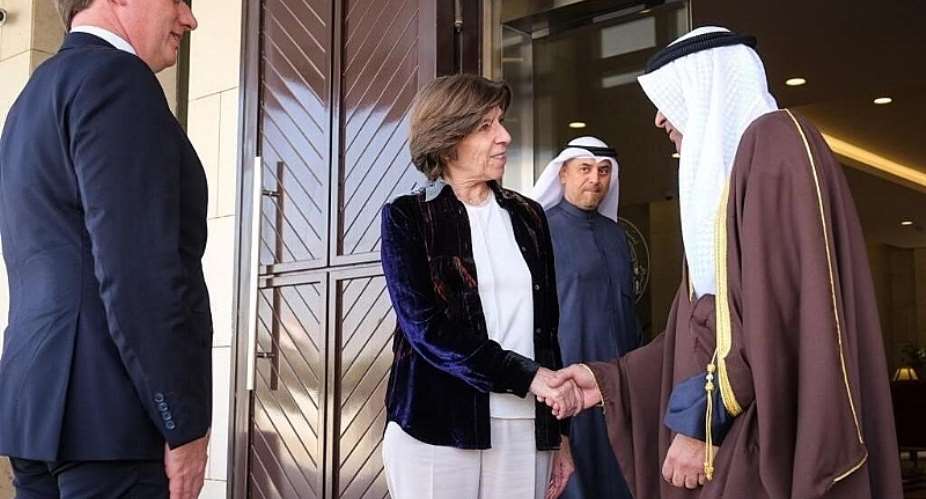French Foreign Minister Catherine Colonna is in Riyadh this Thursday as part of a three-day visit to Saudi Arabia and the United Arab Emirates in a bid to strengthen partnerships in the Middle East amid regional and international instability.
For what is her first visit to the Persian Gulf, Catherine Colonna has chosen to visit two of France's regional allies in the Middle East, whose leaders were received at the Élysée Palace last July, in the hope of boosting cooperation between Paris, Riyadh and Abu Dhabi.
When describing the links that exist between France, Saudi Arabia and the United Arab Emirates, Paris repeatedly refers to a "very strong partnership" and even of friendship, as it tries to advocate its diplomatic clout in easing regional tensions.
According to a French diplomatic source speaking to RFI, Iran's "destabilising policies" have been singled out over its continued work on uranium enrichment, the development of missiles deployed in Middle Eastern countries, and drones – now sold to Russia for its war in Ukraine.
- French foreign minister Colonna says those who ordered Ukraine invasion will be hauled before ICC
- France and Iraq sign strategic agreements on energy, transport
When dealing with Tehran, Paris has advocated both firmness and dialogue, as Iranian policies are having a direct impact on Europe.
However, France also wants to encourage the resumption of negotiations between Saudi Arabia and Iran.
Another concern for France is Lebanon – a country without a president or a functioning government – as it "sinks into chaos," according to the French foreign ministry.
Here too, the support of Riyadh – which enjoys significant influence in Lebanon both politically and in terms of humanitarian support – is essential.
And to avoid the collapse of the country, France has underlined the importance of Gulf states to "invest more widely" in Lebanon.
A dubious friendship
However, France's cosy relationship with Saudi Arabia has irked human rights defenders, with NGOs decrying the kingdom's accelerated use of the death penalty and torture.
According to the British organisation Reprieve and the European Saudi Organisation for Human Rights, the number of executions in Saudi Arabia has doubled.
Since King Salman and his son, Crown Prince Mohammed came to power in 2015, Riyadh has gone from an average of 71 executions per year to 129.
In 2022, 147 people were executed.
The reforms led by Prince Mohammed bin Salman have been highlighted by the authorities on the international scene, but they are accompanied by a relentless crackdown on political dissent.
According to human rights activists the death penalty is being implemented to crush freedom of expression.
The NGOs have also denounced the systematic use of torture – from which minors are not spared – as well procedural violations which lead to unfair trials.
Colonna has said that Iran and nuclear negotiations would be one of the main topics of discussion with her Saudi counterpart.
However, a conversation on Saudi Arabia's poor record on human rights is unlikely to be on the agenda.





 Minority will expose the beneficial owners of SML, recover funds paid to company...
Minority will expose the beneficial owners of SML, recover funds paid to company...
 Prof. Opoku-Agyemang has ‘decapitated’ the NPP’s strategies; don’t take them ser...
Prof. Opoku-Agyemang has ‘decapitated’ the NPP’s strategies; don’t take them ser...
 Abubakar Tahiru: Ghanaian environmental activist sets world record by hugging 1,...
Abubakar Tahiru: Ghanaian environmental activist sets world record by hugging 1,...
 Prof. Naana Opoku-Agyemang will serve you with dignity, courage, and integrity a...
Prof. Naana Opoku-Agyemang will serve you with dignity, courage, and integrity a...
 Rectify salary anomalies to reduce tension and possible strike action in public ...
Rectify salary anomalies to reduce tension and possible strike action in public ...
 Stop all projects and fix ‘dumsor’ — Professor Charles Marfo to Akufo-Addo
Stop all projects and fix ‘dumsor’ — Professor Charles Marfo to Akufo-Addo
 Blue and white painted schools will attract dirt shortly – Kofi Asare
Blue and white painted schools will attract dirt shortly – Kofi Asare
 I endorse cost-sharing for free SHS, we should prioritise to know who can pay - ...
I endorse cost-sharing for free SHS, we should prioritise to know who can pay - ...
 See the four arsonists who petrol-bombed Labone-based CMG
See the four arsonists who petrol-bombed Labone-based CMG
 Mahama coming back because Akufo-Addo has failed, he hasn't performed more than ...
Mahama coming back because Akufo-Addo has failed, he hasn't performed more than ...
